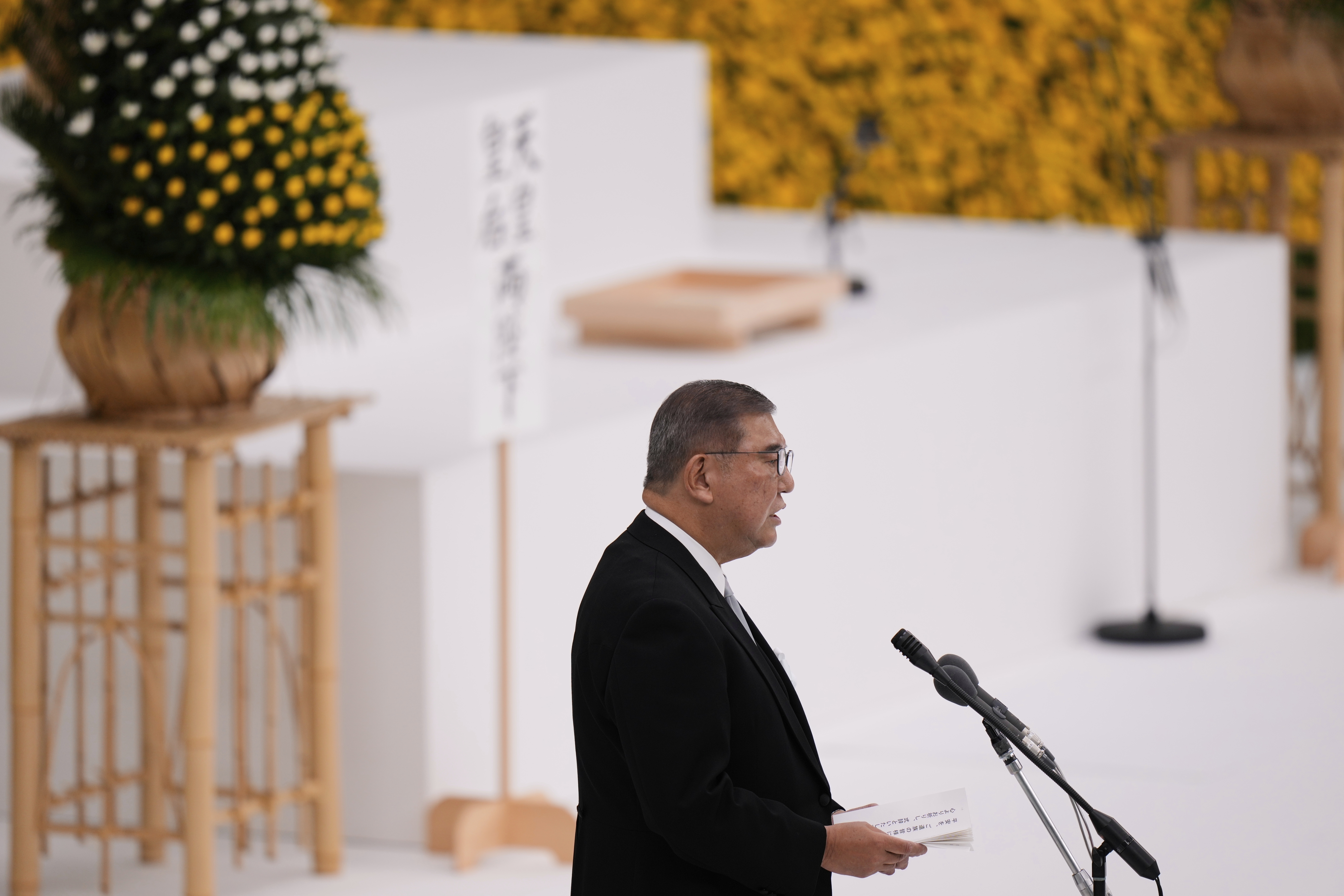
TOKYO - Japanese Prime Minister Shigeru Ishiba on Friday expressed "remorse" in his speech at the annual memorial ceremony for the war dead, as the country marked the 80th anniversary of its unconditional surrender in World War II, but the "remorse" was not on Japan's responsibility for aggression against Asian countries.
Speaking at the memorial in Tokyo, Ishiba said that Japan will never again take the path to war and stressed the need to pass down "painful" memories of the war to future generations as survivors continue to age, adding that "the remorse and lessons from that war should once again be engraved deeply in our hearts."
More than 4,500 people attended the government's National Memorial Ceremony for the War Dead held at Tokyo's Nippon Budokan arena on Friday.
Ishiba became the first Japanese leader since 2012 to use the word "remorse" at the annual commemoration ceremony. Following the precedent set by his recent predecessors, however, he did not directly mention Japan's wartime aggression and the suffering it caused across Asia.
Meanwhile, Japanese media pointed out that the object of the "remorse" in his speech is not "the harm inflicted on Asian countries," but rather the process by which Japan embarked on war.
Since 1994, when then Japanese Prime Minister Tomiichi Murayama explicitly expressed "deep remorse" for the war in his speech at the ceremony, every Japanese prime minister until 2012 had used the word "remorse" at this occasion. However, since former premier Shinzo Abe shunned it in 2013, the phrase had disappeared from a Japanese leader's Aug 15 address.
Japan's right-wing organization "Nippon Kaigi" issued a statement opposing Ishiba's speech, claiming that "remorse" was a political maneuver.
According to local media reports, some forces within the ruling Liberal Democratic Party also opposed Ishiba issuing a statement on historical understanding for the 80th anniversary, arguing that "Abe's statement" had already "brought an end" to relevant post-war talks, and worried that the move would "restart the apology diplomacy."
ALSO READ: Commemorating victory against Japanese aggression
Earlier in the day, Ishiba sent a ritual offering to the notorious Yasukuni Shrine located in central Tokyo, while Farm Minister Shinjiro Koizumi visited the war-linked shrine, marking the first minister confirmed to have done so since Ishiba took office.
Former economic security ministers Sanae Takaichi and Takayuki Kobayashi, as well as ruling Liberal Democratic Party heavyweight Koichi Hagiuda, also visited the shrine on Friday.
In the afternoon, people held banners reading "Oppose Yasukuni Shrine" and "Oppose War" and chanted slogans as they marched through the streets of Tokyo.
The protesters demanded that the Japanese government face up to and take responsibility for its wartime aggression, firmly opposing cabinet members and members of parliament visiting the shrine.
The spokesperson of the Chinese embassy in Japan said that the Yasukuni Shrine is a spiritual tool and a symbol of the Japanese militarists responsible for the war of aggression and honors 14 convicted Class-A war criminals.
The spokesperson said that the essence of the Yasukuni Shrine issue lies in whether the Japanese side can correctly understand and deeply reflect on its history of aggression, whether it can abide by the statements and commitments it has made on historical issues, and whether it can abide by the purposes and principles of the UN Charter and adhere to the path of peaceful development, noting that it is a matter of principle that concerns aggression and anti-aggression, justice and evil, light and darkness.
China urges Japan to face squarely and reflect on its history of aggression, earnestly honor its words and commitment on issues such as the Yasukuni Shrine, make a clean break from militarism, adhere to the path of peaceful development, and earn the trust of its Asian neighbors and the international community through concrete actions, the spokesperson said.


